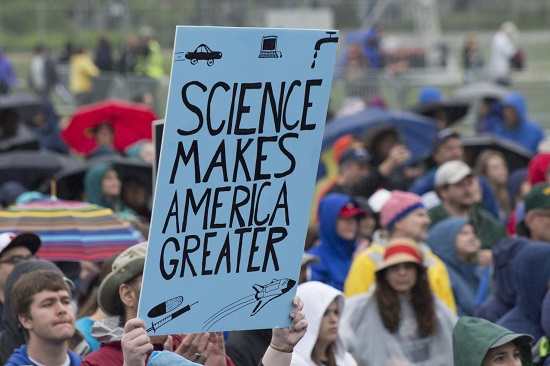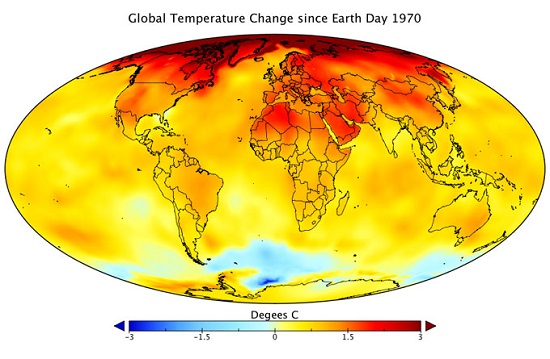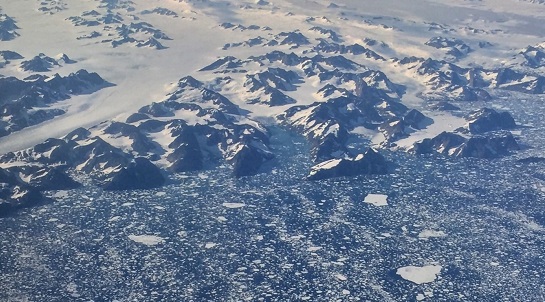2017 SkS Weekly Climate Change & Global Warming News Roundup #17
Posted on 29 April 2017 by John Hartz
A chronological listing of news articles posted on the Skeptical Science Facebook page during the past week. Articles of signifigance as determined by the editor are highlighted in the Editor's Picks' section.
Editor's Picks
Tens of thousands marched for science. Now what?

Just hours after the Washington March for Science dispersed, organizers sent an email to demonstrators with the subject line, “What's next?”
“Our movement is just starting,” the message read. It went on to urge marchers to take part in a “week of action,” a set of coordinated activities that range from signing an environmental voting pledge to participating in a citizen science project. They will provide postcards for participants to send to their political leaders and a calendar of events recommended by the march's partner groups.
The march website was also overhauled Saturday night to include a new page on the organization's vision for the future. The details are not fully fleshed out (and the page still included a few typos Sunday afternoon), but organizers say they aim to build a new science advocacy network and establish programs to better engage the public with science.
“We intend to symbolically keep marching,” said national co-chair Valerie Aquino. “I would love for the March for Science to continue growing into a global movement.”
That goal will require a sea change in how scientists think about outreach. But after the success of the march, which turned out tens of thousands of demonstrators in more than 600 cities, organizers think it could happen.
Tens of thousands marched for science. Now what? by Sarah Kaplan, Speaking of Science, Washington Post, Apr 23, 2107
China, India Become Climate Leaders as West Falters

Less than two years after world leaders signed off on a historic United Nations climate treaty in Paris in late 2015, and following three years of record-setting heat worldwide, climate policies are advancing in developing countries but stalling or regressing in richer ones.
In the Western hemisphere, where centuries of polluting fossil fuel use have created comfortable lifestyles, the fight against warming has faltered largely due to the rise of far-right political groups and nationalist movements. As numerous rich countries have foundered, India and China have emerged as global leaders in tackling global warming.
Nowhere is backtracking more apparent than in the U.S., where President Trump is moving swiftly to dismantle environmental protections and reverse President Obama’s push for domestic and global solutions to global warming.
The U.S. isn’t alone in its regression. European lawmakers are balking at far-reaching measures to tackle climate change. Australian climate policy is in tatters. International efforts to slow deforestation in tropical countries are failing.
China, India Become Climate Leaders as West Falters by John Upton, Climate Central, Apr 24, 2017
 April 1970 through March 2017 temperature trend from Berkeley Earth.
April 1970 through March 2017 temperature trend from Berkeley Earth.
With the first quarter of 2017 now past, the year is shaping up to be one of climate extremes: high temperatures, low sea ice, and coral bleaching.
Global surface temperatures continue to increase in-line with climate model predictions, and the world has now experienced an increased global temperature of about 0.8 degrees C (1.5 degrees F) since 1970. Temperatures for the first three months of the year were actually warmer than the 2016 average, and there is a reasonable chance that 2017 for a fourth consecutive year will be the warmest on record.
Global sea ice extent is near historic lows in the Arctic and Antarctic, and Arctic sea ice volume has also been decreasing as it ages and thins, with less new ice to replace it. The Great Barrier Reef experienced an unprecedented second consecutive year of coral bleaching, the only major coral bleaching on record to have occurred other than in an El Niño year.
Worrisome first quarter of 2017 climate trends by Zeke Hausfather, Yale Climate Connections, Apr 27, 2017
An Ice-Free Summer in the Arctic Ocean Would Be Deadly for the Northern Hemisphere

Arctic sea ice near the coast of Greenland in September of 2015 at the peak of the melt season. (Photo: Bob Berwyn)
Climate scientists don’t like to get pinned down on making date-specific projections about the effects of global warming. But after months of watching Arctic sea ice languish at a record low, the big question has surfaced once again: When will we see the Arctic’s first ice-free summer?
According to University of Exeter climate researcher James Screen, the latest modeling suggests that, unless heat-trapping greenhouse gas emissions stop soon, an ice-free Arctic summer will happen as soon as 2046.
“That’s our best estimate, give or take 20 years,” Screen said during an April 24th press conference at the European Geosciences Union conference in Vienna. The ice decline is clearly linked with rising global temperatures, and the chances that the Arctic will be ice-free increase dramatically when the average global temperature rises between 1.7 and 2.1 degrees Celsius, Screen said.
An Ice-Free Summer in the Arctic Ocean Would Be Deadly for the Northern Hemisphere by Bob Berwyn, Pacific Standard, Apr 28, 2017
The kids suing Donald Trump are marching to the White House

The kids suing Donald Trump are marching to the White House by John Sutter, CNN, Apr 29, 2017
Sun Apr 23, 2017
- There’s a Leadership Vacuum on Climate Change. Business Should Fill It by Andrew Winston, Harvard Business Review, Apr 21, 2017
- UK launches ‘world first’ research programme into negative emissions by Simon Evans, Carbon Brief, Apr 21, 2017
- March for Science: mad scientists in action by Carla Bleiker, Deutsche Welle (DW), Apr 22, 2017
- March for Science: Protesters gather worldwide to support 'evidence' by Laura Smith-Spark & Jason Hanna, CNN, Apr 22, 2017
- Defending science: How the art of rhetoric can help by Leah Ceccarelli, The Conversation US, Apr 20. 2017
- India's 2017 monsoon rains seen at average levels: weather office by
- How a Melting Arctic Changes Everything by Eric Roston & Blacki Migliozzi, Bloomberg News, Apr 19, 2017
- Bloomberg To World Leaders: Ignore Trump’s Ideas On Climate Change, AP/CBS New York, Apr 23, 2017
Mon Apr 24, 2017
- The effects of climate change will force millions to migrate. Here’s what this means for human security. by Kelly M. McFarland & Vanessa Lide, Monkey Cage, Washington Post, Apr 23, 2017
- The Surprising List of States Leading U.S. on Renewable Energy by Zahra Hirji, InsideClimate News, Apr 21, 2017
- 15 Climate Change Facts That You'll Know Are True If You're Not An Idiot by Erin La Rosa, BuzzFeed, Apr 22, 2017
- How The March For Science Finally Found Its Voice by Ed Young, The Atlantic, Apr 24, 2017
- Bloomberg Adds Climate Change Site To Its Financial News Empire by Alexander C. Kaufman, Huffington Post US, Apr 20, 2017
- Pictures From the March for Science, New York Times, Apr 22, 2017
- China, India Become Climate Leaders as West Falters by John Upton, Climate Central, Apr 24, 2017
- The Electric Car Revolution Now Faces Its Biggest Test by Tom Randall, Climate Changed, Bloomberg News, Apr 24, 2017
- Record-breaking climate events all over the world are being shaped by global warming, scientists find by Chelsea Harvey, Energy & Environment, Washington Post, Apr 24, 2017
Tue Apr 25, 2017
- As global groundwater disappears, rice, wheat and other international crops may start to vanish by David Bersndsten, PBS News Hour, Apr 17, 2017
- Here come back-to-back science and climate marches. Organizers insist there’s no competition. by Chelsea Harvey, Energy & Environment, Washington Post, Apr 21, 2017
- Tens of thousands marched for science. Now what? by Sarah Kaplan, Speaking of Science, Washington Post, Apr 23, 2107
- Extreme Arctic Melt Is Raising Sea Level Rise Threat; New Estimate Nearly Twice IPCC's by Sabrina Shankman, InsideClimate News, Apr 25, 2017
- Trump to set new executive orders on environment, energy this week by David Shepardson and Valerie Volcovici. Reuters, Apr 24, 2017
- Trump's Climate Cuts Could Result in Half-Billion Extra Tons of CO2 in the Air by Marianne Lavelle, InsideClimate News, Apr 25, 2017
- SkS Analogy 2 - Ferrari Without Gas by Evan, Skeptical Science, Apr 24, 2017
- Record-challenging heat possible for climate march in Washington on Saturday by Jason Samenow, Capital Weather Gang, Washington Post, April 25, 2017
- March against madness - denial has pushed scientists out into the streets by Dana Nuccitelli, Climate Consensus - the 97%, Guardian, Apr 25, 2017
Wed Apr 26, 2017
- Cut fossil fuel use ‘dramatically’ to meet climate goals, says Shell-backed report by Simon Evans, Carbon Brief, Apr 25, 2017
- Networks Covering March For Science Provided Platform For Climate Deniers by Kevin Kalhoefer, Media Matters for America, Apr 24, 2017
- The nightmare scenario for Florida’s coastal homeowners – sea levels rising by Christopher Flavelle, Domain, Apr 21, 2017
- Did 'people power' save a trove of EPA data from a shutdown by Trump? by Michael Hiltzik, Los Angeles Times, Apr 24, 2017
- Most global investors recognise financial risk of climate change, report finds by Paul Karp, Guardian, Apr 25, 2017
- Our Climate Future Is Actually Our Climate Present by Jon Mooallem, New York Times Magazine, Apr 19, 2017
- Rising Seas Will Send Millions of Refugees to Inland Cities by Marlene Cimons, Nexus Media, Apr 24, 2017
- Scientists keep increasing their projections for how much the oceans will rise this century by Chris Mooney, Energy & Environment, Washington Post, Apr 21, 2017
Thu Apr 27, 2017
- State Department Memo Boosts Case to Stay in Paris Climate Pact by Jennifer A Dlouhy & Nick Wadhams, Bloomberg News, Apr 25, 2017
- The Regulatory Accountability Act Subverts Science and Must Be Stopped by Michael Halpern, Union of Concerned Scientists, Apr 26, 2016
- I’m Elise, and I’m a Scientist Marching in the Peoples Climate March. This Is Why. by Elsie Tolbert, Blog, Union of Concened Scientists, Apr 24, 2017
- Looming 'catastrophe' in East Africa proves why world must tackle climate change, says Oxfam by Ian Johnston, Independent, Apr 27, 2017
- The Trump White House is at war with itself about climate change by Chris Mooney & Juliet Eilperin, Energy & Environment, Washington Post, Apr 26. 2017
- Climate models have underestimated Earth’s sensitivity to CO2 changes, study finds by Jim Shelton, Yale News, Apr 4, 2017
- Sowing Climate Doubt Among Schoolteachers, Opinion by Curt Stager, New York Times, Apr 27, 2017
- El Niño and the end of the global warming hiatus by Jim Shelton, Yale News, Apr 26, 2017
Fri Apr 28, 2017
- Germany Calls Rick Perry’s Push to Rework Paris Climate Agreement ‘Absurd’ by Joe Ryan & Brian Parkin, Bloomberg News, Apr 26, 2017
- U.S. Vulnerable to Worst of Extreme Sea Rise by John Upton, Climate Central. Apr 26, 2017
- How is this weekend’s climate march different from its predecessor? ‘Now, the task is full-on resistance.’ by Brady Dennis, Energy & Environment, Washington Post, Apr 26. 2017
- Climate Scientists Cancelling Their New York Times Subscription Over Hiring of Climate Denialist Bret Stephens by Graham Readfearn, DeSmog, Apr 27, 2017
- Amazon’s fate hangs on outcome of war between opposing worldviews by Sue Branford & Maurício Torres, Mongaby, Apr 27, 2017
- We owe our planet this climate march. But we also owe it – very faint – hope, Opinion by Bill McKibben, Guardian, Apr 28, 2017
- Impacted Communities Draw 'Red Line' for Mother Earth Across US Capitol by Lauren McCauley, Common Dreams, Apr 28, 2017
- New study: global warming keeps on keeping on by John Abraham, Climate Consensus - the 97%, Guardian, Apr 27, 2017
Sat Apr 29, 2017
- The Faith Community & Climate Change by John Gehring, Commonweal, Apr 27, 2017
- Suddenly, the future doesn’t seem so far away by Sarah Perkins-Kirkpatrick Diary of a Climate Scientist, Inside Story, Apr 28, 2017
- The kids suing Donald Trump are marching to the White House by John Sutter, CNN, Apr 29, 2017
- 5 Year Study: What Happens in the Arctic Does not Stay in the Arctic by Peter Sinclair, Climate Crock of the Week, Apr 25, 2017
- Climate March expected to draw massive crowd to D.C. in sweltering heat by Chris Mooney, Energy & Environment, Washington Post, Apr 29, 2017
- An Ice-Free Summer in the Arctic Ocean Would Be Deadly for the Northern Hemisphere by Bob Berwyn, Pacific Standard, Apr 28, 2017
- Worrisome first quarter of 2017 climate trends by Zeke Hausfather, Yale Climate Connections, Apr 27, 2017
- EPA website removes climate science site from public view after two decades by Chris Mooney & Juliet Eilperin, Energy & Environment, Washington Post, Apr 29, 2017
- Yes, I am a climate alarmist. Global warming is a crime against humanity, Opinion by Lawrence Torcello, Guardian, Apr 29, 2017
- NY Times hired a hippie puncher to give climate obstructionists cover by Dana Nuccitelli, Climate Consensus – the 97%, Guardian, Apr 29, 2017































 Arguments
Arguments






























Comments